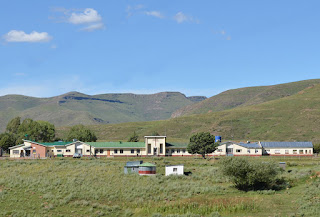 |
| At the airport in August |
I’ve spent time in many different places during the past 6
months. Nearly a month of my time here has been spent in Cape Town, both on
holiday and work. I’ve spent over 4 months in Maseru and now a month here at
the Hospital! Not to mention some time in Grahamstown, SA and a trip to Kenya
that’s coming up next month. Needless to say, it’s been the busiest 6 months
I’ve ever had. I’m excited to be at the hospital now and I’m loving the feeling
of being settled for a change. It’s been a lot of moving around so it’s nice to
have a place to call home for longer than a few weeks or months!
 |
| St. James circa late 1960's |
Life at the hospital is chugging along, as it has for the
past 50 years. Ntate John, the hospital Administrator, gave me 2 books on the
history of St. James. Both were written by doctors who spent a considerable
number of years here, but the one that has been most interesting is the one
written by Dr. Kenneth Luckman, the first doctor at St. James. His book tells
the story of how he accepted the call to be the doctor at a mission hospital
that hadn’t even been built yet! I’m a bit of a history buff, especially local
history, so reading about how the community came together to help build this
institution is really cool.
 |
| St. James today |
 |
| One of the villages around the Hospital |
Although Mantsonyane is still pretty remote compared to many
places in the world, it’s made some big strides since the 1960’s. When Dr.
Luckman first arrived, there wasn’t even a road that stretched from Maseru to
the hospital site. The dirt road from Maseru stopped about 12 miles away in
a village called Marakabei. Those 12 miles had to be traveled on foot or, if
you were lucky, horseback. I’m still really baffled about how they got all of
the building materials and hospital equipment over those mountain passes
without the use of vehicles. Then again, the resourcefulness of the Basotho
never ceases to amaze me! The road to Maseru today is completely paved. The
trip can take you just over 2 hours, which is a huge improvement over the 6+
hours that it took during Dr. Luckman’s time. Many of the luxuries that we take
for granted everyday in the States really only arrived here in Mantsonyane
within the past decade. For example, the paved road or even telephones. The
hospital got its first landline in the mid 2000’s. Before then, it was
completely dependant on a shortwave radio tower to talk to Maseru. It’s really
a crazy story. I believe Dr.
Luckman’s book may be out of print, but you can try and find a copy here if
interested.
 |
| A typical village toilet |
 |
| New and expecting mothers at the weekly natal clinic |
It’s really interesting to compare the health challenges
that the hospital faced just starting out to the challenges that the hospital
faces today. With the exception of HIV/AIDS related illnesses, the major health
issues that the hospital deals with on a day-to-day basis really have not
changed that much in the past 50 years. For instance, maternal health issues
have always been a major focus of the hospital. On any given day you can find a
handful of Basotho women waiting around to give birth. Women sometimes show up
2 months away from their expected delivery date, a practice that has taken
place since the hospital’s start. Since travel to the hospital can involve
hours on horseback over mountain passes, Basotho women do not have the luxury
of waiting until labor starts to head to the hospital. Early arrival is often
the only way to guarantee that they’ll be seen by a doctor during delivery. It
also helps the hospital provides meals and housing for the expecting mothers
during their stay!
With each day here I grow more and more at ease with life in
Mantsonyane. People are starting to recognize me and are realizing that I’m not
just a strange, possibly lost visitor walking through town. Since I’m a
foreigner and I work at the hospital, people just assume that I’m a doctor,
which could not be further from the truth. The closet thing I have to a medical
degree is an expired CPR certification. Walking through town, I've had people come shake my hand and call me doctor or yell “Hello, Doctor” as I pass
by. I even had a lady at one of the local shops pull down her shirt collar to
show me a rash on her neck and asked if I knew what it was. I informed her that
I was, if fact, not a doctor, to which she quickly covered her neck back up and
avoided eye contact with me for the rest of our interaction. Hopefully people
will soon start to realize that I’m not a new doctor over at St. James. Until
then, I’ll continue to bask in the undeserved recognition!
It’s been a crazy first 6 months of my YASC experience.
Let’s hope the next 6 months are filled with as much love and warmth as the
past 6 months have been! I've got some exciting news to announce soon, so make sure to check back here in the coming weeks. Sala hantle!



